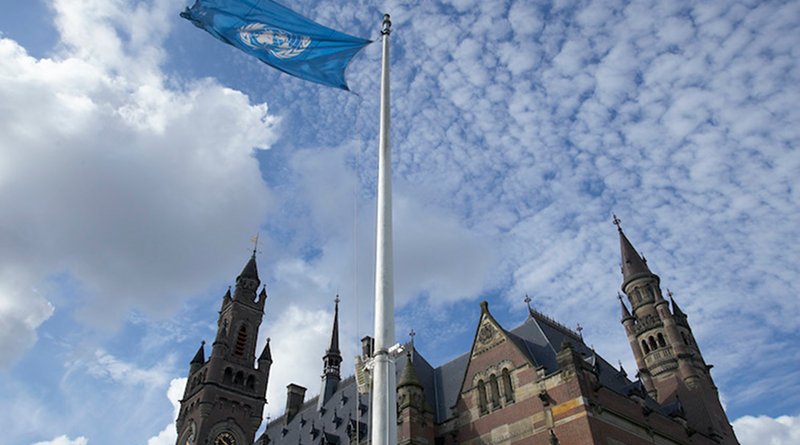
The Peace Palace in The Hague (Netherlands), seat of the International Court of Justice. Credit: Jeroen Bouman - Courtesy of the ICJ.
Should The World Support South Africa’s Accusations Against Israel? – OpEd
By Ambassador Kazi Anwarul Masud
Nesrine Malik of The Guardian rightly pointed out that it’s not only Israel on trial. South Africa is testing the West’s claim to moral superiority. The world, she writes, has failed Gaza in ‘live-streamed genocide’, South Africa’s delegation says at ICJ. This is not the only challenge to an international order that has made Palestinian claims so difficult to validate. The ICJ case shows how Western logic is wearing thin and its persuasive power waning in a multipolar world.
The significance of the fact that the country bringing the case is South Africa – an icon of the ravages of colonialism, settlement, and apartheid – cannot be lost on anyone. It symbolizes a vast racial injustice, too raw and recent to be dismissed as ancient history. In the figure of Nelson Mandela, there lies an evocative example of moral clarity undimmed by persecution. It is no surprise that the support expressed for South Africa is entirely from countries in the Global South. While the world should have no qualms in supporting Nesrine Malik’s assertion on the argument presented by South Africa, the leader of the African continent, one still gropes for a definitive answer to the question of what constitutes genocide.
A somewhat quest can be found in the book of Martin Shaw, a professor of International Relations and Politics at the University of Sussex where he tries to present his definition as follows: – “a form of violent social conflict, or war, between armed power organizations that aim to destroy civilian social groups and those groups and other actors who resist this destruction”. Referring to the adoption of adoption of the 1948 Convention on the Prevention and Punishment of the Crime of Genocide an analyst assesses the worthiness of Martin Shaw’s definition of genocide she writes while Shaw’s definition is worthy of consideration, it can never be used in a legal context. Resisting the perpetrator’s intention, he offers genocide acts as “action in which armed power organizations treat civilian social groups as enemies and aim to destroy their real or putative social power, using killing, violence, and coercion against individuals whom they regard as members of the group”.
Shaw’s book provides a conceptual understanding of the many conflicting opinions surrounding the legal definition of genocide within the Genocide Convention and raises the reader’s awareness of the possibility of studying genocide in a sociological context. What Shaw does not do is provide a definitive answer to the question he intended to answer: What is genocide?
Leaving aside the answer to the question raised to scholars and experts (I claim to be neither) let me borrow the definition from Encyclopedia Britannica which says that genocide is the deliberate and systematic destruction of a racial, religious, political, or ethnic group. In 1946 the UN General Assembly declared genocide a punishable crime. By this declaration, genocide by definition may be committed by an individual, group, or government, against one’s people or another, in peacetime or wartime. This last point distinguishes genocide from “crimes against humanity,” whose legal definition specifies wartime. Suspects may be tried by a court in the country where the act was committed or by an international court.
An example of genocide more recent than the Holocaust is the slaughter of the Tutsi people by the Hutu in Rwanda in the 1990s. The most horrific example of genocide was committed by Adolf Hitler’s Nazi Germany. Able-bodied Jewish prisoners were sent to a slave labor camp, while the aged, the weak, and children and their mothers were killed. Some prisoners were also subjected to medical experiments, conducted by Josef Mengele. The camp was gradually abandoned in 1944–45 as Soviet troops advanced. The total number who died at Auschwitz is estimated at between 1.1 million and 1.5 million, 90% of which were Jews.
People of my generation still shiver at the gruesome genocide committed by the Pakistani Military Junta on unarmed Bengalis in the dead of night in 1971 and committed unspeakable atrocities making millions to run for shelter to neighboring India where the Indian Prime Minister Indira Gandhi opened her arms to embrace the fleeing Bengalis from persecution. The uncrowned leader of the Bengalis Bangabandhu Sheikh Mujibur Rahman was arrested by the Pakistani military where the ruling Military Junta of Yahya Khan and his cohorts sentenced him to death. Many books and articles have been written on Bangabandhu’s detention in then Pakistan and his return to free Bangladesh. One more by me will only be a drop in the ocean that I feel to be unnecessary. We are now on the path to progress and prosperity as the World Bank indicates.
No comments:
Post a Comment